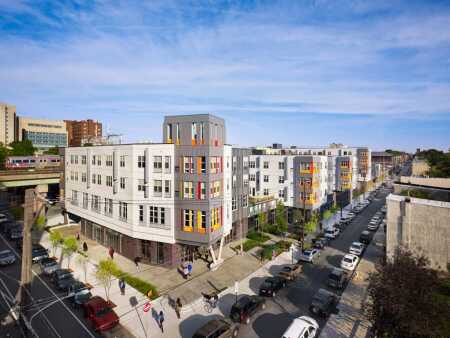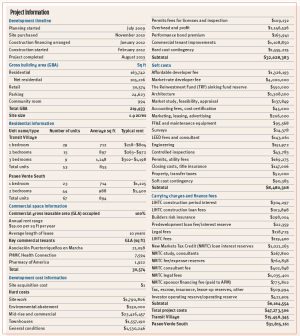Paseo Verde is a 120-unit mixed-income multifamily rental development on a 1.9-acre (0.8 ha) infill site in the ethnically and economically diverse neighborhood of North Philadelphia.
The project was built by a partnership between an established community development corporation, Asociación Puertorriqueños en Marcha (Association of Puerto Ricans on the March, or APM), and an experienced developer committed to affordability and sustainability, the Jonathan Rose Companies. The one- to three-bedroom apartments accommodate a mix of households and incomes and offer on-site gardens, gathering spaces, and medical and fitness facilities.
Visit the New Online Home for ULI Case Studies
Launched in 1970 by activist Vietnam War veterans dissatisfied with the public services available to the Puerto Rican community of eastern North Philadelphia, APM focuses its community and economic development activities in that neighborhood, which experienced severe hardship as industries and residents abandoned Philadelphia.
The planning process highlighted the financial and housing challenges of residents, notably the area’s need for a supermarket. To address these issues, APM won city housing investments to build hundreds of housing units, ranging from low-rise houses for moderate-income families to mid-rise apartments for low-income people with disabilities—in all, leveraging over $140 million in private and public investments.
Paseo Verde is a keystone development that connects an ethnically diverse, low-income neighborhood to the adjacent train station and to Temple University, the city’s largest institution of higher education. The site sits less than two miles (3.2 km) north of Center City Philadelphia and one block east of the university.
Rail Connections
Immediately west of the site is the elevated Temple University station on Philadelphia’s regional rail system, the Southeastern Pennsylvania Transportation Authority (SEPTA), where 12 regional rail lines make the trip to Center City in just four minutes; several bus lines and the Broad Street subway also traverse the neighborhood.
Today, trains pull up alongside a mosaic of bright green panels, with tree-shaded roof gardens peeking through. A health clinic that had been hidden inside a public housing complex now announces its presence with a campanile, or bell tower; wide windows on the clinic and complex face a broad sidewalk bustling with pedestrians.
Above the ground floor, which houses the clinic, are 120 environmentally sustainable homes that are affordable for downtown commuters, university students, and families leaving public housing, all of whom can benefit from green views and healthful amenities. Within Paseo Verde’s 220,000 square feet (20,000 sq m) of space are 120 rental apartments, ranging from one to three bedrooms; 30,600 square feet (2,800 sq m) of commercial space; a 994-square-foot (92 sq m) community room; and 25,000 square feet (2,300 sq m) of indoor parking.
The structure’s steel and concrete-plank ground floor spans much of the site, with commercial space facing Berks Street at the south end of the site, adjacent to the rail station’s primary entrance. Residential lobbies, one small retailer, and a community room face east along the long Ninth Street frontage. A separate three-story building with six streetfront entrances faces Norris Street at the north end, separated from the larger structure by a driveway. A garage with 67 parking spaces is tucked behind the residential lobbies, as are a fitness room and bicycle storage rooms. Total project cost was $47.3 million, using off-the-shelf technologies.
Sustainability
Paseo Verde achieved three platinum certifications under the Leadership in Energy and Environmental Design (LEED) program devised by the U.S. Green Building Council, including LEED for Neighborhood Development (LEED ND) across the entire site and LEED for Homes designations for both its mid-rise and townhouse buildings.
Camille Galdes is senior associate for research and digital media at ULI. Payton Chung is director of case studies and publications.
To read the full case study, visit ULI’s new Case Studies website: casestudies.uli.org.






